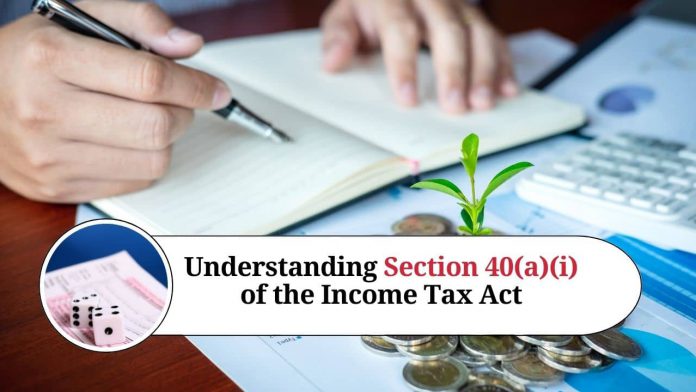As a taxpayer in India, it is essential to understand the various provisions of the Income Tax Act. One such provision that taxpayers need to be aware of is Section 40(a)(i) of the Income Tax Act. This section deals with the disallowance of certain expenses if the taxpayer has not deducted the TDS (Tax Deducted at Source) on such expenses.
What is Section 40(a)(i)?
Section 40(a)(i) of the Income Tax Act states that any sum paid by the taxpayer as interest, commission, brokerage, rent, royalty, fees for professional services, fees for technical services, or any other sum chargeable under the Income Tax Act, shall be disallowed as an expense in the computation of taxable income if the taxpayer has not deducted TDS on such payments.
In simple terms, if a taxpayer has made a payment towards any of the above-mentioned expenses and has not deducted TDS on the same, the expense amount cannot be claimed as a deduction while computing taxable income.
For example, if a company has paid a rent of Rs. 1 lakh per month towards its office space but has not deducted TDS on the same, the entire rent amount of Rs. 12 lakhs for the financial year would be disallowed as an expense under Section 40(a)(i).
Exceptions to Section 40(a)(i)
There are certain exceptions to Section 40(a)(i) that taxpayers need to be aware of. These exceptions are as follows:
- If the sum paid to the resident is below the threshold limit specified under the Income Tax Act, no TDS is required to be deducted, and hence, Section 40(a)(i) will not apply.
- If the taxpayer can prove that the sum paid by him is for personal use and not for any business purpose, Section 40(a)(i) will not apply.
- If the taxpayer can prove that the sum paid by him is not chargeable to tax, Section 40(a)(i) will not apply.
- If the taxpayer has deducted the TDS but has failed to deposit the same to the government’s account, Section 40(a)(ia) will be applicable instead of Section 40(a)(i).
In conclusion
Section 40(a)(i) of the Income Tax Act is an essential provision that taxpayers need to be aware of. It is crucial to ensure that the TDS is deducted and deposited on time to avoid any disallowance of expenses under this section. Taxpayers must keep in mind the exceptions to this section to ensure that they do not lose out on legitimate deductions while computing their taxable income.
Other Related Blogs: Section 144B Income Tax Act
Frequently Asked Questions (FAQs)
Q.1 What is Section 40(a)(i) of the Income Tax Act?
A. Section 40(a)(i) of the Income Tax Act deals with the disallowance of certain expenses if the taxpayer has not deducted TDS (Tax Deducted at Source) on such expenses.
Q.2 What expenses are covered under Section 40(a)(i)?
A. Section 40(a)(i) covers expenses such as interest, commission, brokerage, rent, royalty, fees for professional services, fees for technical services, and any other sum chargeable under the Income Tax Act.
Q.3 What happens if TDS is not deducted on such expenses?
A. If TDS is not deducted on such expenses, the expense amount cannot be claimed as a deduction while computing taxable income. The entire expense amount will be disallowed as per Section 40(a)(i).
Q.4 Are there any exceptions to Section 40(a)(i)?
A. Yes, there are exceptions to Section 40(a)(i). For example, if the sum paid to the resident is below the threshold limit specified under the Income Tax Act, no TDS is required to be deducted, and hence, Section 40(a)(i) will not apply.
Q.5 What if TDS is deducted but not deposited to the government account?
A. If TDS is deducted but not deposited to the government account, Section 40(a)(ia) will be applicable instead of Section 40(a)(i).
Q.6 Can a taxpayer claim such expenses in the subsequent year if TDS is deducted and deposited in that year?
A. No, the taxpayer cannot claim such expenses in the subsequent year. The disallowance will apply to the year in which the expense was incurred, and TDS was not deducted.
Q.7 Can a taxpayer claim such expenses if they were not claimed in the previous year due to non-deduction of TDS?
A. No, the taxpayer cannot claim such expenses in any subsequent year if they were not claimed in the previous year due to non-deduction of TDS.




















